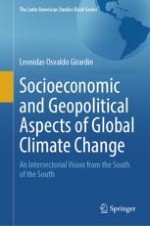This book discusses climate change from an academic point of view centered on and from Latin America. Although climate change is a global issue, there has been a notable lack of input from the Latin American perspective, which means that many Latin American intellectuals often bring ideas, tools and potential solutions proposed by external, international research centers or organizations to the region. This book embraces a Latin American viewpoint to critically engage the problem and many of the concepts used in the analysis of climate change.
The text emphasizes heterogeneity as an essential factor that cannot be absent in the analysis of how to understand and face the challenges posed by climate change. This heterogeneity refers not only to the magnitude of the impact that different regions will experience (including in their productive activities, ecosystems and social groups), but also to their contexts and capacities. Different countries' and regions' historical accumulated emissions—the primary cause of the current atmospheric concentrations of greenhouse gases—can inform current responsibilities, and their diverse productive structures will also contribute to different baselines in energy, agriculture and other sectors. Asymmetries in economic, technological and political capacities to face climate-related challenges will influence the social and economic costs of potential adaptation and mitigation measures.
Using this conceptual approach, the book focuses on some of the main climate change-linked impacts expected in the region, such as effects on semi-arid ecosystems, and feasible, sector-specific adaptation measures. Furthermore, it contextualizes mitigation measures that appear on the international agenda (including the utilization of economic instruments to flexibilize the fulfillment of climate commitments) in the Latin American region.
Socioeconomic and Geopolitical Aspects of Global Climate Change: An Intersectorial Vision from the South of the South offers socioeconomic and geopolitical analysis from the perspective of a region that is going to suffer impacts disproportionately greater than its historical and current responsibility in triggering this global environmental threat.
